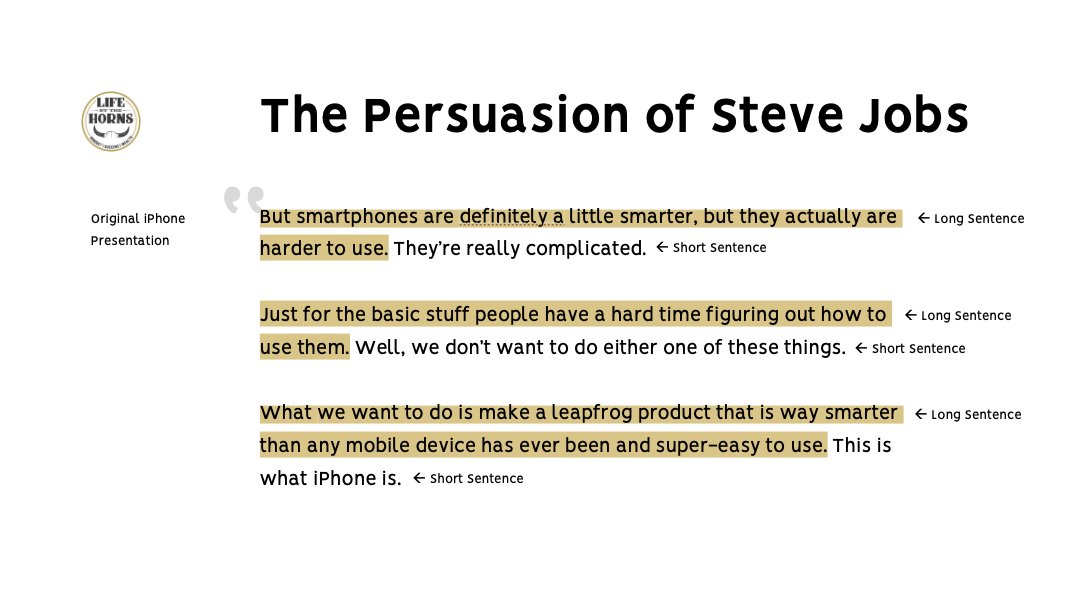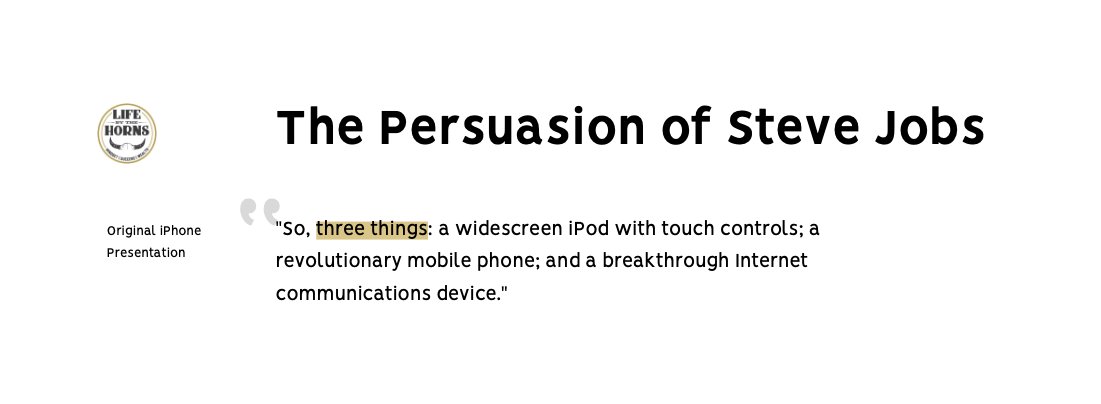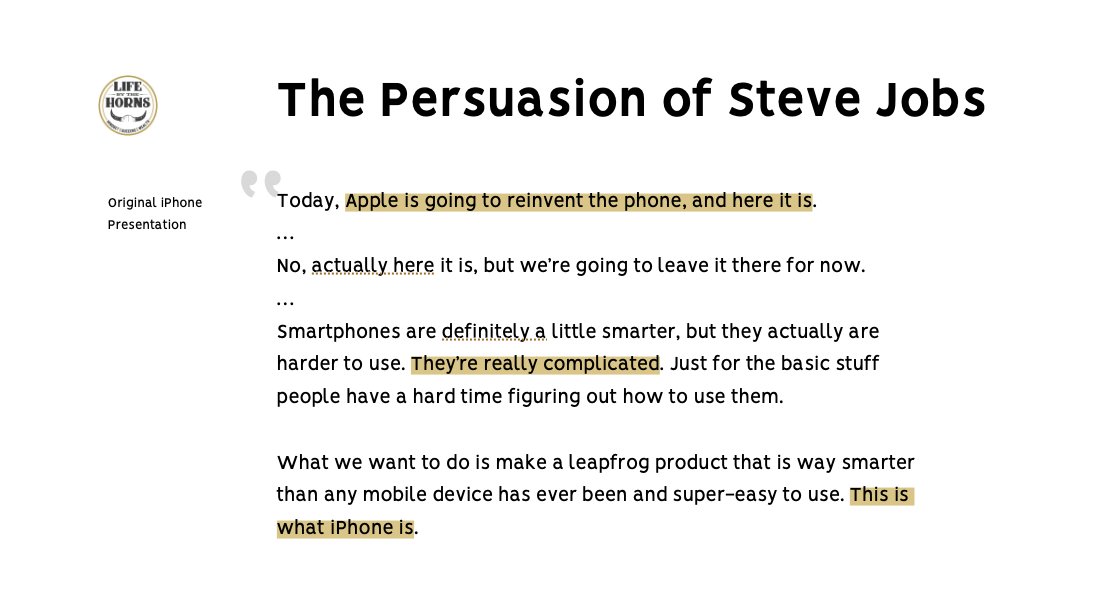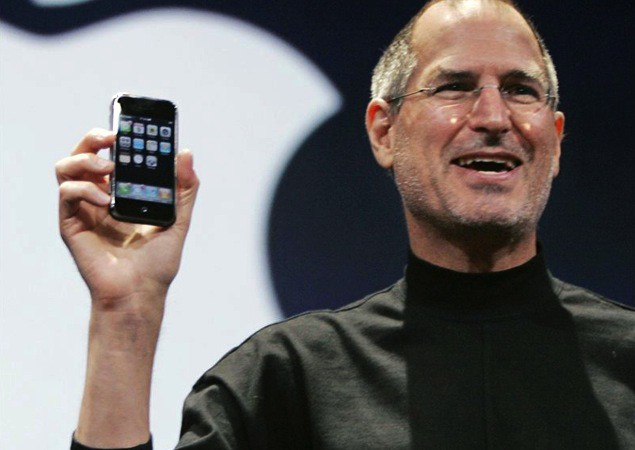How To Persuade Like Steve Jobs
5 Lessons In 5 Tweets
[ THREAD ]
Let& #39;s go https://abs.twimg.com/emoji/v2/... draggable="false" alt="👇" title="Rückhand Zeigefinger nach unten" aria-label="Emoji: Rückhand Zeigefinger nach unten">
https://abs.twimg.com/emoji/v2/... draggable="false" alt="👇" title="Rückhand Zeigefinger nach unten" aria-label="Emoji: Rückhand Zeigefinger nach unten">
5 Lessons In 5 Tweets
[ THREAD ]
Let& #39;s go
1: Generate Rhythm
Jobs varies his sentence length.
He uses a long sentence. And then a short one.
Long. Short.
He toggles back and forth. This allows him to communicate complex ideas while still holding interest.
Take a look...
Jobs varies his sentence length.
He uses a long sentence. And then a short one.
Long. Short.
He toggles back and forth. This allows him to communicate complex ideas while still holding interest.
Take a look...
2: Use the Rule of Three
The Rule of Three is a principle of communication that says 3 is the most persuasive number.
Things conveyed in threes are both rhythmic and easy to understand — and can easily be stored in working memory.
The Rule of Three is a principle of communication that says 3 is the most persuasive number.
Things conveyed in threes are both rhythmic and easy to understand — and can easily be stored in working memory.
The Declaration of Independence used the Rule of Three:
"Life, liberty, and the pursuit of happiness."
And Steve Jobs used it to introduce the the iPhone, the biggest product launch in Apple history...
"Life, liberty, and the pursuit of happiness."
And Steve Jobs used it to introduce the the iPhone, the biggest product launch in Apple history...
3: Employ Contrast
People are comparison machines.
When you pick up a heavy bag and then a lighter one, the second bag will appear lighter than it actually is.
Why?
Because our brains compare things based on what’s most recent and available in memory.
People are comparison machines.
When you pick up a heavy bag and then a lighter one, the second bag will appear lighter than it actually is.
Why?
Because our brains compare things based on what’s most recent and available in memory.
Steve Jobs knew that contrast is one of the most potent weapons of persuasion.
Look at how he compared the iPhone to other "smartphones."
Look at how he compared the iPhone to other "smartphones."
Read more about contrast: https://twitter.com/LifeHornsWay/status/1295776396778889217">https://twitter.com/LifeHorns...
4: Keep It Simple
Persuasion grandmasters don& #39;t worry about sounding "smart."
They worry about being understood.
As a result, they use simple words.
Persuasion grandmasters don& #39;t worry about sounding "smart."
They worry about being understood.
As a result, they use simple words.
Look at how uncluttered these sentences are:
—Apple is going to reinvent the phone, and here it is.
—They& #39;re really complicated.
—This is what iPhone is.
—Apple is going to reinvent the phone, and here it is.
—They& #39;re really complicated.
—This is what iPhone is.
5: Make It Visual
Apple is famous for its product releases.
And what does it always do?
Product demos.
Jobs didn& #39;t just *tell* you how great Apple products were. He *showed* you.
Tap into visuals.
Show. Don& #39;t tell.
Apple is famous for its product releases.
And what does it always do?
Product demos.
Jobs didn& #39;t just *tell* you how great Apple products were. He *showed* you.
Tap into visuals.
Show. Don& #39;t tell.
Conclusion:
As a persuasion grandmaster, Steve Jobs employed the best tactics of influence:
1. Generate rhythm
2. Use the Rule of 3
3. Employ contrast
4. Keep it simple
5. Make it visual
Good news is, you can do these things too https://abs.twimg.com/emoji/v2/... draggable="false" alt="👇" title="Rückhand Zeigefinger nach unten" aria-label="Emoji: Rückhand Zeigefinger nach unten"> https://gumroad.com/l/xUhyJ ">https://gumroad.com/l/xUhyJ&q...
https://abs.twimg.com/emoji/v2/... draggable="false" alt="👇" title="Rückhand Zeigefinger nach unten" aria-label="Emoji: Rückhand Zeigefinger nach unten"> https://gumroad.com/l/xUhyJ ">https://gumroad.com/l/xUhyJ&q...
As a persuasion grandmaster, Steve Jobs employed the best tactics of influence:
1. Generate rhythm
2. Use the Rule of 3
3. Employ contrast
4. Keep it simple
5. Make it visual
Good news is, you can do these things too
That& #39;s all friends!
If you found this valuable, please RT the top tweet: https://twitter.com/LifeHornsWay/status/1312464335290023936">https://twitter.com/LifeHorns...
If you found this valuable, please RT the top tweet: https://twitter.com/LifeHornsWay/status/1312464335290023936">https://twitter.com/LifeHorns...

 Read on Twitter
Read on Twitter![Rückhand Zeigefinger nach unten How To Persuade Like Steve Jobs5 Lessons In 5 Tweets[ THREAD ]Let& #39;s go https://abs.twimg.com/emoji/v2/... draggable=](https://pbs.twimg.com/media/EjbMswZXkAUKIse.png) " title="How To Persuade Like Steve Jobs5 Lessons In 5 Tweets[ THREAD ]Let& #39;s go https://abs.twimg.com/emoji/v2/... draggable="false" alt="👇" title="Rückhand Zeigefinger nach unten" aria-label="Emoji: Rückhand Zeigefinger nach unten">" class="img-responsive" style="max-width:100%;"/>
" title="How To Persuade Like Steve Jobs5 Lessons In 5 Tweets[ THREAD ]Let& #39;s go https://abs.twimg.com/emoji/v2/... draggable="false" alt="👇" title="Rückhand Zeigefinger nach unten" aria-label="Emoji: Rückhand Zeigefinger nach unten">" class="img-responsive" style="max-width:100%;"/>







